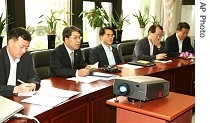2007年VOA标准英语-North, South Korea Postpone Rare Summit, Citing(在线收听)
Seoul
18 August 2007
North and South Korea have postponed a summit planned for later this month. North Korea asked for the delay until October because of extensive flood damage in the impoverished communist nation. VOA's Kurt Achin reports from Seoul.
 |
| South Korean Unification Minister Lee Jae-joung, second from left, holds a emergency meeting with senior officers to discuss the postponed Koreas Summit, 18 Aug 2007 |
He says the North requested the delay due to heavy flooding damage, and the South accepted.
International relief agencies corroborate North Korean media reports that weeks of flooding have taken a serious toll on the country's agriculture and infrastructure.
North Korea says 11 percent of the country's rice and cornfields have been destroyed, and more than 300,000 people have been made homeless.
On Friday, South Korea announced a $7 million package of emergency aid supplies for the North. The United States is pledging $100,000 in new aid to relief agencies, which will devote the funds to purchasing emergency flood supplies for North Korea.
 |
| A building flooded with water from the Taedong River in Pyongyang, 14 Aug 2007 |
WFP officials say even in a normal year, North Korean food production falls far short of its needs. The organization is mobilizing emergency food rations, and says it will consult with donors on easing the longer-range impact of the damage.
Experts say North Korea's food crisis, which reached a peak in the mid-1990s with the starvation deaths of hundreds of thousands, is the result of decades of economic mismanagement. Annual floods take such a severe toll on the North mainly because impoverished residents have clear-cut mountainsides of any vegetation that can be eaten or burned as fuel.
South Korea has become one of the North's most important economic partners since the two countries held their first and only summit in 2000. Seoul regularly sends millions of dollars worth of rice, fertilizer, and other humanitarian aid across the border, often drawing criticism that the transfers are not sufficiently monitored.
The two Koreas are, in legal terms, still at war. Fighting was halted by a 1953 armistice three years after North Korea invaded the South. South Korean officials say they hope the upcoming summit between South Korean President Roh Moo-hyun and North Korean leader Kim Jong Il will lay the groundwork for a formal peace.